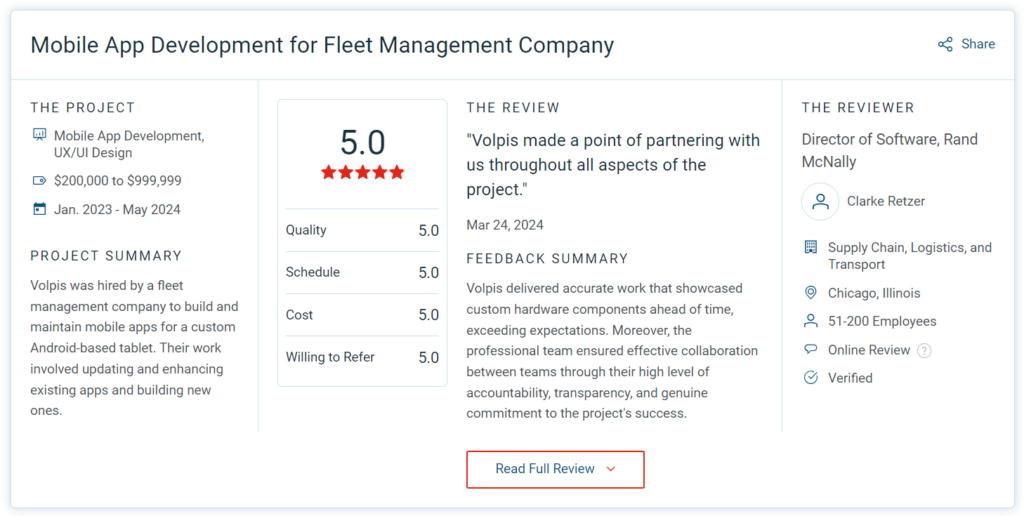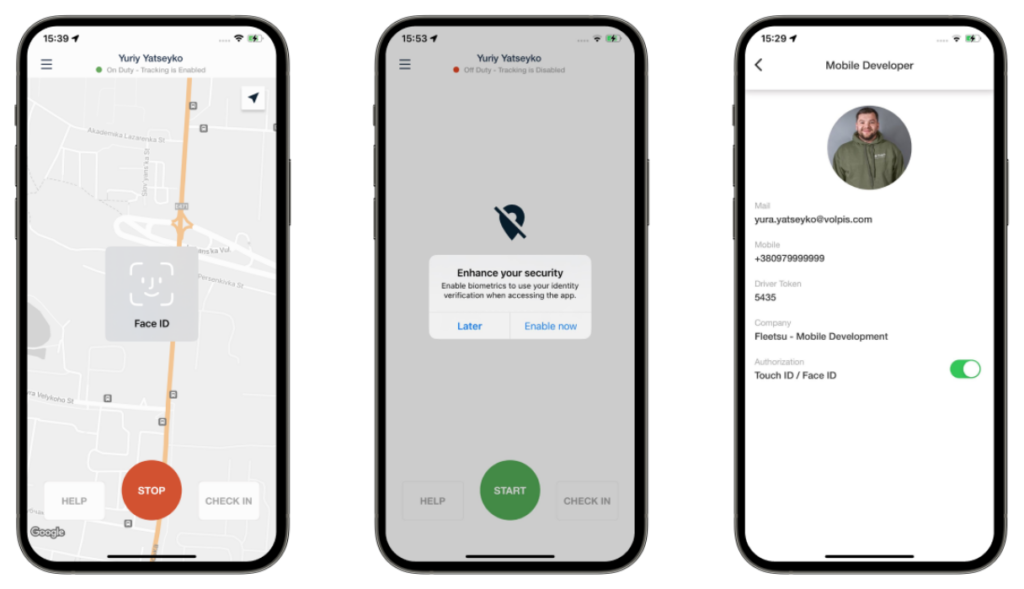The fleet management industry is in for a wild ride. With the ever-evolving technology and changing customer needs, it’s becoming increasingly important to stay up-to-date with the latest fleet management trends. These include:
- Increased adoption of electric vehicles, as companies look to reduce their carbon footprint and take advantage of the lower costs associated with EVs.
- Integration of advanced technologies, such as IoT devices, AI, and machine learning, to improve fleet efficiency and reduce maintenance costs.
- Greater focus on sustainability, with fleet managers looking for ways to reduce emissions and promote eco-friendly practices.
- Improved safety features, including driver monitoring systems and collision avoidance technology, to reduce accidents and protect drivers.
- Increased use of data analytics, as fleet managers seek to gain insights into their operations and make data-driven decisions to improve efficiency and profitability.
With the rapid growth of the fleet management industry, it is essential for companies to stay on top of the latest trends in order to remain competitive. One way for fleet managers to effectively leverage the latest fleet industry trends is by utilizing modern fleet management solutions.
In this article, we‘ll explore the top fleet management trends that are expected to dominate the industry. You’ll learn how these trends can help your company remain efficient, profitable, and sustainable.
In this evolving landscape, vehicle management software development services are poised to play a pivotal role in enabling fleet managers to seamlessly incorporate these cutting-edge trends into their operations. And here at Volpis, we can empower your business to harness the benefits of these transformations. If you have any questions about the latest trends or custom software development process, you can reach out to us via info@volpis.com, our team is always happy to assist you.
Top 5 fleet management trends for 2025

As the world becomes more connected and technology continues to advance, fleet management is experiencing a significant transformation. So, let’s dive in and take a closer look at what the future holds for fleet management.
Trend 1: Increasing adoption of electric vehicles

The increased adoption of EVs in fleet management is driven by several factors, including environmental concerns and cost savings.
Effective cost management is crucial for fleet managers to achieve their financial objectives while keeping their operations running efficiently. One major benefit of an electric vehicle is its reduced operational costs.
EVs have lower maintenance costs compared to traditional vehicles, making them more cost-effective in the long run. Additionally, electric fleet vehicles produce lower emissions, which can help companies meet sustainability goals.
Examples:
Delivery giant Amazon has ordered 100,000 electric delivery vans from EV manufacturer Rivian. Other companies, such as UPS, FedEx, and DHL, have also started incorporating electric vehicles into their fleets.
Trend 2: Integration of advanced technologies

AI, machine learning, and predictive analytics are becoming increasingly important in fleet management. New technologies can provide fleet managers with a more comprehensive view of vehicle health and performance, allowing for improved efficiency and reduced operating costs. The increasing demand for faster delivery times is also a contributing factor to the adoption of new technology.
One key technology that is being integrated into fleet management is telematics. Telematics monitoring devices can track everything from vehicle location and speed to fuel consumption and driver behavior. In addition, telematics data can be combined with other sources of data, such as weather and traffic conditions, to provide a more complete picture of fleet operations.
Integrating advanced telematics systems can provide fleet managers with real-time insights into the health and performance of their entire fleet. By gathering and analyzing this data, managers can create more efficient routes, monitor idle time, and identify areas for improvement.
The benefits of using advanced technologies in fleet management go beyond efficiency and cost savings. For instance, integrating these technologies can also improve safety by providing real-time driver monitoring and collision avoidance systems. Furthermore, the use of renewable energy sources can help reduce emissions and promote sustainability.
Examples:
UPS has implemented a suite of advanced analytics tools to optimize delivery routes and improve fuel efficiency. Meanwhile, automotive manufacturer Tesla has incorporated AI and machine learning algorithms into its electric vehicles to provide real-time vehicle performance monitoring and automatic software updates.
Trend 3: Greater focus on sustainability

Fleet management is increasingly focusing on sustainability, with more and more companies prioritizing the reduction of their carbon footprint and adopting eco-friendly practices. One way that the fleet manager can achieve this is by using alternative fuels or renewable energy sources.
One popular alternative fuel is compressed natural gas (CNG), which emits lower levels of greenhouse gases than traditional gasoline or diesel. Another option is biofuels, which are derived from renewable sources such as plant matter and can be used in existing diesel engines with few modifications.
Electric vehicles (EVs) are also a popular option for many fleet managers looking to reduce emissions. EVs produce zero tailpipe emissions, making them an attractive choice for companies looking to reduce their environmental impact.
In addition to reducing emissions, sustainable practices can also lead to cost savings for fleet managers. For example, EVs have lower operational costs than traditional fleet vehicles, and the use of renewable energy sources can help reduce fuel costs and decrease reliance on fossil fuels.
Examples:
The delivery company DHL has set a goal to have 70% of its own first- and last-mile delivery services in 225 cities worldwide with clean pickup and delivery solutions like EVs by 2025. Similarly, Amazon has committed to powering its global operations with 100% renewable energy by 2025.
Trend 4: Improved safety features

Driver safety is a top priority in fleet management. The implementation of advanced fleet safety features can help reduce the risk of accidents and improve overall safety. Advanced safety features such as driver monitoring systems and collision avoidance technology are essential to keep drivers safe on the road.
One example of advanced safety features is Advanced Driver Assistance Systems (ADAS), which can include features such as lane departure warnings, adaptive cruise control, and blind-spot detection. These features can help drivers avoid accidents and reduce the risk of collisions.
Collision avoidance technology is another safety feature that is becoming increasingly popular in fleet management. This technology adoption allows sensors and cameras to detect potential collisions and provide fleet drivers with warnings or automatic braking.
One way that fleet managers can improve driver safety is by implementing in-cab video monitoring systems. This technology can record and analyze driver behavior, helping to identify patterns of unsafe driving and providing opportunities for driver coaching and training.
The benefits of using advanced safety features in fleet management are significant. By reducing the risk of accidents, companies can protect their drivers and cargo, minimize downtime and repair costs, and maintain a positive reputation for safety.
Examples:
The beverage company Coca-Cola has installed ADAS in their fleet of delivery trucks, while delivery company UPS has implemented collision avoidance technology in their trucks. Also, The transportation company Schneider has implemented fatigue detection technology in their fleet to reduce accidents caused by driver fatigue.
Trend 5: Increased use of data analytics

Effective fleet management depends on accurate and timely data collection. You can gain valuable insights into your fleet management operations and make informed decisions through the use of data analytics.
One application of data analytics in fleet management is predictive analytics, which can be used to forecast demand and optimize routes.Predictive analytics can help the fleet manager to anticipate potential problems and make proactive decisions to address them before they occur.
Fleet managers can benefit from robust reporting tools that provide real-time visibility into fleet operations By analyzing fleet data on risky driver behavior, you can identify patterns of unsafe driving and implement training programs to improve driver safety. Predictive analytics can also be used to optimize delivery routes and minimize delivery times.
The potential benefits of using data analytics in fleet management are significant. By analyzing data, managers can improve operational efficiency, save money, and enhance customer satisfaction. Fleet tracking solutions have become an essential tool for fleet managers to monitor their vehicles and improve their operations.
Examples:
The logistics company C.H. Robinson uses predictive analytics to forecast demand and optimize shipping routes.
If you have any questions about fleet management trends, our experts would be happy to answer them and provide you with insights on how to leverage them to improve your operations. Contact us today to learn more.
By leveraging these trends, fleet managers can optimize their operations, reduce costs, and increase productivity while also promoting sustainability and safety. In addition to the trends discussed in this article, other technologies such as blockchain, virtual reality, and autonomous vehicles are expected to play a significant role in the future of fleet management. We highly recommend attending fleet management conferences which can provide a unique opportunity to learn about best practices and emerging technologies, enabling fleet managers to enhance operations in ways that are both efficient and sustainable.
How to implement fleet management trends in your fleet
The fleet management industry is undergoing a significant transformation, driven by the adoption of electric vehicles, integration of advanced technologies, greater focus on sustainability, improved safety features, and increased use of data analytics.
To ensure seamless integration of advanced technologies and best practices into fleet management, you can check out our latest guide for fleet management application development. It can serve as a roadmap for developing innovative solutions that align with the industry’s evolving needs and trends.
One key aspect of effective fleet management is proper tracking and preventive maintenance of fleet assets. Integration of advanced technologies can help improve vehicle maintenance by predicting and detecting issues before they occur. You can use AI and machine learning to analyze telematics data and provide insights into fleet operations. For example, predictive analytics can anticipate when a vehicle will likely require maintenance, allowing managers to schedule repairs before a breakdown occurs.
If you have any questions regarding the latest trends in fleet management and how they can be incorporated into your software, we are more than happy to provide you with answers and insights. Please do not hesitate to schedule a free consultation.
Your trusted fleet management software development partner
Volpis is a software development company that specializes in developing custom fleet management software solutions for businesses. Regularly ranked among the Top Custom Software Development Companies on Clutch, Volpis has been leveraging the power of technology to assist business owners in reaching unparalleled milestones. Our commitment to excellence is reflected in the glowing reviews from our customers, who consistently praise our dedication to delivering exceptional results.

Read more reviews from our valuable customers here
Our team, consisting of over 40 in-house experts, brings extensive experience and creativity to each project. We invite you to explore our portfolio for a detailed look at the software systems we have developed for our clients.
One example of our expertise is the development of Fleetsu, a software designed to help businesses optimize their fleet operations. The result was a highly efficient and effective solution that helped the client save time and money while improving their fleet performance.

We’d love to answer any questions you may have. You can reach out to us via info@volpis.com with any questions or to explore how we can be part of your journey.






